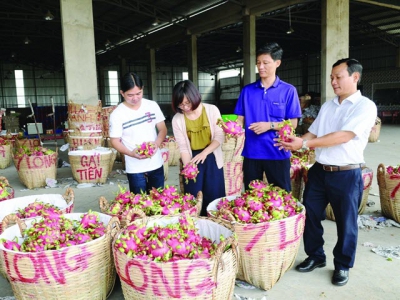Mekong Delta farmers urged to link up with global value chains

Mekong Delta authorities are encouraging farmers to develop agricultural, forestry and fishery products associated with strengthening linkages and building safe food supply chains in order to expand their market.
The industry and trade sector focuses on improving business support and trade promotion for agricultural products of Mekong Delta localities
Rice, fruit, seafood
With an area of about 3.94 million hectares, accounting for 12 percent of the country’s area, the Mekong Delta has become Vietnam’s leading production and export region of rice, seafood and fruit. However, climate change and extreme weather have severely affected production, urgently requiring sustainable and adaptive development.
According to Nguyen Duy Linh Thao, Chair of the Club of the Provincial Trade Promotion Center, the Mekong Delta rice output is about 24 million tonnes, accounting for 80 percent of the country’s rice output; fruit yields have reached about 4.3 million tonnes, accounting for 65 percent of the whole country’s output. In addition, aquatic output reached over four million tonnes, with key export products such as shrimp accounting for 60 percent and pangasius for 95 percent of the country’s total.
The agricultural economy plays an important role in the Mekong Delta’s economic development, prompting provinces in the region to pioneer agricultural restructuring.
Dong Thap Province has prioritized investment in key commodities such as rice, ornamental flowers, mango, pangasius, changed production methods, strengthened cooperation and market linkages in order to reduce costs and increase product quality. Many high-tech, smart and clean agriculture models have opened up a new approach, boosting the production value of the province’s farming industry to more than VND13.17 trillion in 2020, an increase of VND508 billion compared to the same period in 2019.
Production standards
Can Tho city’s agricultural industry has built and developed a large-scale paddy fields model with a total area of over 30,000ha per crop. Some 100ha of rice production have received a Global Good Agriculture Practices (Global GAP) certificate and 336ha of rice production have reached Vietnamese Good Agricultural Practices (VietGAP) standards. Moreover, Can Tho has also expanded its safe vegetable production area with a total area of 229ha and an output of over 28,390 tonnes per year, with 10.5ha meeting VietGAP standards.
The city not only has built and formed typical branded fruit products and concentrated production areas with an area of 7,984 hectares, but also encouraged producers to associate with distributors, processors and consumers in order to form safe food supply chains. So far, Can Tho has 59 chains with 295 confirmed products, with all growers having inked contracts with distributors and retailers to promote product consumption in the domestic and export markets.
An Giang Province also produces about 625,000ha of rice annually, more than 54,700ha of vegetables of all kinds, 18,000ha of fruit and aquaculture with an annually output of about 532,000 tonnes. Most farms are encouraged to produce according to VietGAP models, using high technology that yields higher product quality and value.
Global value chain
Globalization, international integration and climate change create difficulties and challenges for the Mekong Delta’s agriculture. Specifically, most of the exported products are raw and preliminary processed products, and agricultural products lack geographical indication. In addition, production is still small, fragmented and lacks uniformity. Moreover, low level of science and technology, especially in preservation and deep processing, leads to poor quality and weak competition.
Vice President of the European Chamber of Commerce in Vietnam (EuroCham) Nguyen Hai Minh said the EU market in particular and export markets in general require very strict export agricultural standards of traceability, quarantine, hygiene and sustainable development. If Vietnamese enterprises meet these standards, they will go further and consolidate their position and increase the value of their food supply chain.
In addition to promoting investment in developing a sustainable agricultural economy in association with environmental protection, provinces and cities in the region should give priority to developing infrastructure and human resources. Accordingly, the 13 Mekong Delta provinces and cities need to propose to the Central Government to not only promote the development of infrastructure with synchronous connection with each other and with Ho Chi Minh City, but also develop a national target program for regional development, and establish an international climate change research center located in the Mekong Delta.
According to Vu Ba Phu, Director General of the Vietnam Trade Promotion Agency under the Ministry of Industry and Trade, in order to further improve the quality of business support activities and trade promotion, especially for agricultural exports, the Mekong Delta needs to adopt regional strategic goals on information technology application and digital transformation. Localities need to focus on forming digital ecosystems, quickly issue growing area codes to ensure traceability of agricultural products, and build brand names for products, businesses and industries in parallel with trade promotion activities.
Related news
 Đồng Tháp produces high-quality mangoes to meet export requirements
Đồng Tháp produces high-quality mangoes to meet export requirements The Cửu Long (Mekong) Delta province of Đồng Tháp is cultivating mangoes under good agricultural practices (GAP) standards and developing linkages among
 Agricultural exports set to join more global value chains as new FTAs take effect
Agricultural exports set to join more global value chains as new FTAs take effect Vietnamese farm produce exporters are expected to benefit from increased participation in global value chains as a result of the Regional Comprehensive
 Farmer fixes salty soil to plant fruit for export
Farmer fixes salty soil to plant fruit for export A farmer has managed to improve saline intruded soil to grow high-quality grapefruits for export in Kiên Giang Province of the Mekong Delta region.